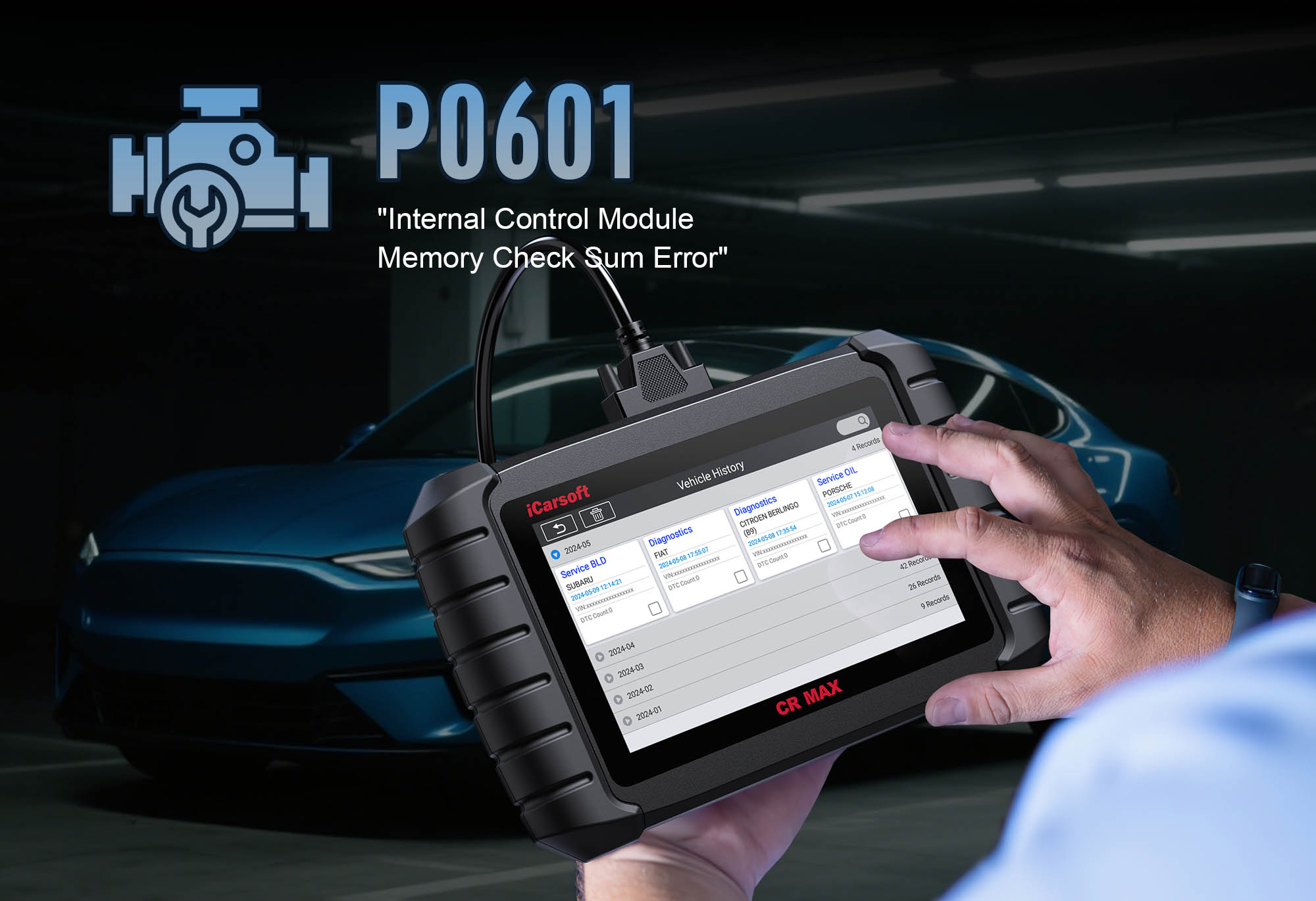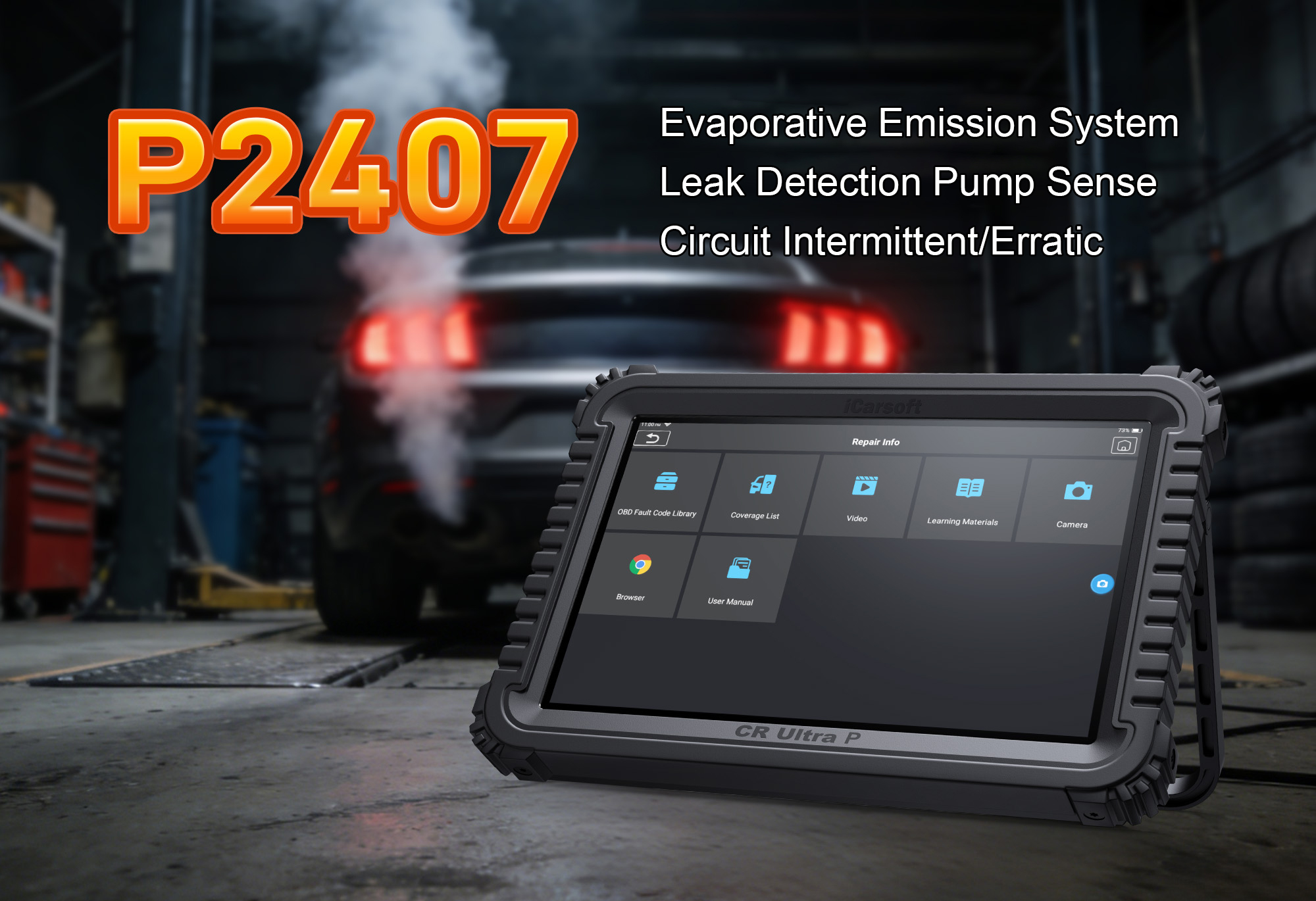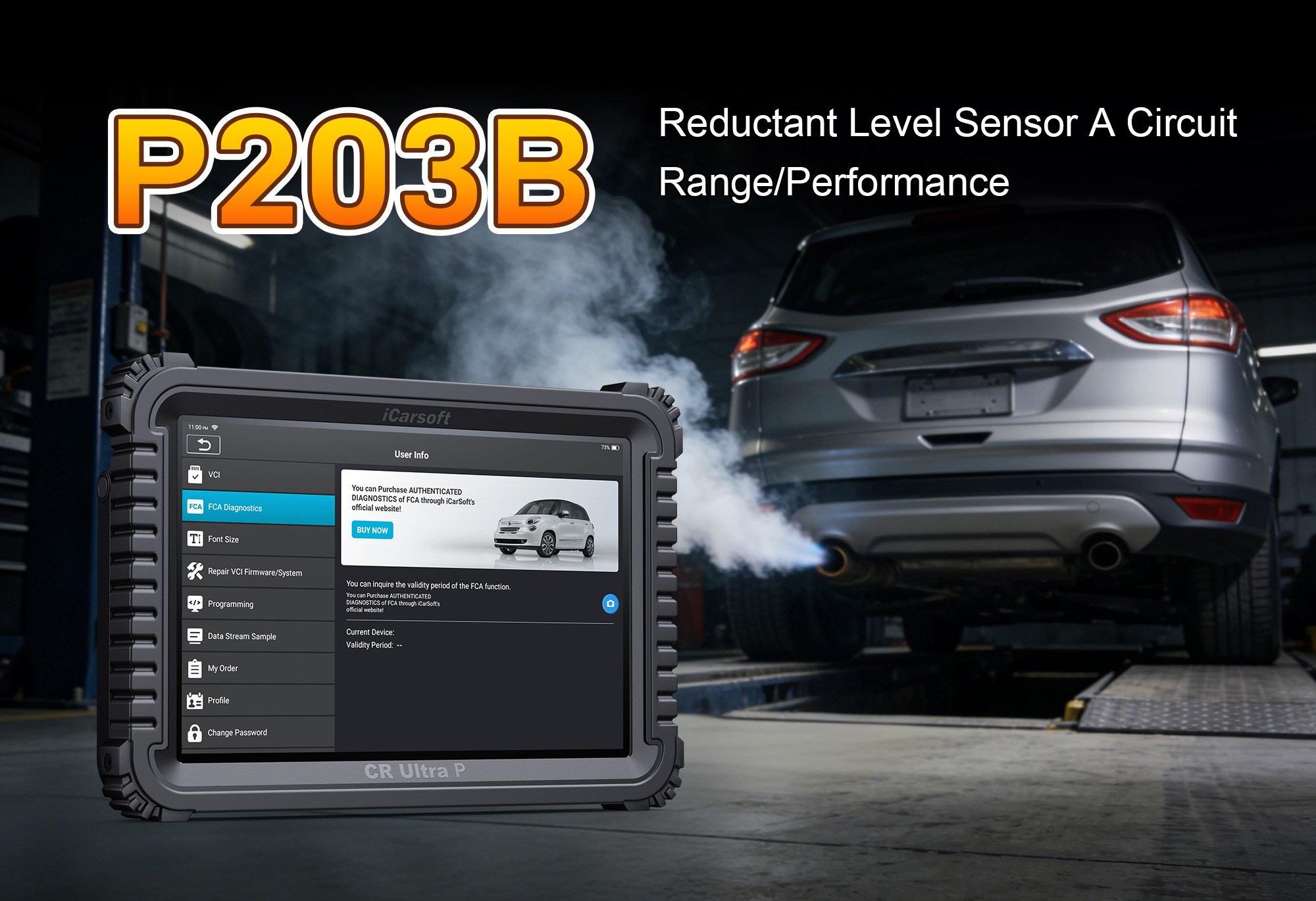Diagnose & Clear P0601 with iCarsoft CR MAX: Fix PCM Internal Control Module Memory Error
If your check engine light stays on and a scan returns P0601, your vehicle is signaling a critical issue with its engine management system. This generic OBD-II code stands for "Internal Control Module Memory Check Sum Error"—meaning the Powertrain Control Module (PCM) has detected a corruption or mismatch in its internal memory, where critical operating software and calibration data are stored.
The PCM acts as your vehicle’s "brain," controlling fuel injection, ignition timing, transmission shifting, and emissions systems. Its memory stores essential data like fuel maps, sensor calibration values, and operating parameters. When P0601 occurs, corrupted memory prevents the PCM from accessing valid data, leading to erratic performance, failed emissions tests, or even a no-start condition.
Basic scanners might only label P0601 as a "PCM memory error" but can’t distinguish between software glitches, voltage issues, or hardware failure. The iCarsoft CR MAX solves this with PCM-specific diagnostics, voltage monitoring, and vehicle-specific firmware details. Let’s walk through how to diagnose and resolve P0601.
Why It Matters
Ignoring P0601 risks catastrophic engine or transmission damage, as the PCM relies on intact memory to make safe operating decisions. Corrupted data can cause the PCM to miscalculate fuel injection (leading to lean/rich misfires), misadjust ignition timing (damaging pistons), or fail to control transmission shifts (wearing clutches). In severe cases, P0601 triggers a "limp mode" that limits speed to 30–40 mph, stranding you unexpectedly.
For vehicles in emissions-testing states, P0601 guarantees a failed test—costing re-test fees and potential fines. Additionally, a faulty PCM can drain the battery or damage the alternator by sending erratic voltage signals. Addressing P0601 promptly with the iCarsoft CR MAX not only restores performance but also protects your vehicle from cascading electrical and mechanical failures.
Understanding P0601: Causes & Key Symptoms
To tackle P0601 effectively, first map its impact on the PCM and related vehicle systems:
Key Symptoms of P0601
-
Persistent Check Engine Light: Illuminates immediately after startup, as the PCM detects memory corruption during self-tests (won’t clear with basic scanners).
-
Erratic Performance: Random misfires, hesitation during acceleration, or stalling—PCM uses fallback "limp mode" parameters to prevent damage.
-
Transmission Issues: Hard shifting, delayed gear changes, or inability to shift out of park (in vehicles where the PCM controls the transmission).
-
No-Start Condition: Severe memory corruption may prevent the PCM from triggering fuel injection or ignition—engine cranks but won’t start.
-
Failed Emissions Tests: Incorrect fuel/air mixture from bad PCM data causes high levels of hydrocarbons (HC) or carbon monoxide (CO).
Common Causes of P0601
|
Cause
|
Description
|
|
PCM Memory Corruption
|
Software glitches from incomplete updates, voltage spikes, or aging EEPROM (electrically erasable programmable read-only memory) chips.
|
|
Voltage Irregularities
|
Low battery voltage (below 12V), alternator overcharging (above 15V), or loose battery connections disrupting PCM power during data writes.
|
|
Failed PCM Hardware
|
Defective memory chips, damaged circuit boards, or fried capacitors preventing proper data storage/retrieval.
|
|
Water Intrusion
|
Moisture in the PCM housing (common in underhood or under-dash locations) shorting circuits and corrupting memory.
|
|
Aftermarket Modifications
|
Improperly installed performance tuners, chips, or electrical accessories (e.g., high-power stereos) causing voltage spikes or overwriting factory PCM data.
|
Why iCarsoft CR MAX Excels at Diagnosing P0601
Basic OBD-II scanners can’t access the PCM’s internal diagnostics, but the iCarsoft CR MAX is tailored to PCM memory issues with these key features:
PCM Self-Test Results
Retrieves detailed error codes from the PCM’s internal diagnostic system (not just generic OBD-II data)—identifies specific memory sectors (e.g., EEPROM) with corruption.
Voltage Monitoring
Tracks battery and PCM power supply voltage (12.0–14.5V target) in real time, spotting spikes/drops that cause memory corruption.
Firmware Version Checks
Verifies current PCM software against manufacturer latest versions—flags corrupted or outdated firmware that triggers P0601.
PCM Location & Wiring Diagrams
Shows exact PCM placement and power/ground connections for visual inspections—avoids guesswork when checking for water damage or loose wires.
Battery & Charging System Tests
Diagnoses weak batteries, faulty alternators, or poor ground connections—addresses the #1 cause of P0601 before replacing the PCM.
Auto VIN Detection
Identifies your vehicle’s exact PCM model and calibration ID—ensures firmware updates and tests use vehicle-specific parameters.
Step-by-Step: Diagnose P0601 with iCarsoft CR MAX
-
1. Connect & Confirm the Code
Plug the CR MAX into your vehicle’s OBD-II port (under the dashboard) and power it on. Select your vehicle via Auto VIN (fast and accurate) or manual entry (make/model/year). Navigate to Engine > Fault Codes > Read Codes to confirm P0601. Tap Code Details for vehicle-specific insights (e.g., "Ford: PCM EEPROM Checksum Mismatch" or "Chevrolet: Internal Memory Validation Failure").
-
2. Check for Related Codes
P0601 rarely appears alone—scan for these PCM/electrical faults to narrow the root cause:
- P0602/P0603/P0604: PCM Internal Control Module Memory Errors (specific memory sector failures)
- P0606: PCM Processor Fault (broader hardware issue, not just memory)
- P0560/P0562/P0563: System Voltage Malfunctions (low/high voltage, confirms power issue)
Address voltage-related codes first—they’re often the trigger for P0601.
-
3. Test Battery & Charging System
Voltage irregularities cause 60% of P0601 cases—verify with the CR MAX:
1. Navigate to Special Functions > Electrical > Battery Test.
- Off voltage: 12.4–12.7V (healthy); below 12.4V = weak battery.
- Running voltage (engine on): 13.5–14.5V (healthy); over 15V = alternator overcharging; under 13V = alternator failure.
2. Inspect battery terminals: Clean corrosion with a wire brush, tighten connections, and apply dielectric grease.
3. Run Charging System Analysis to confirm alternator output—replace if outside specs.
-
4. Monitor PCM Power Supply
The PCM needs stable voltage to protect memory—monitor with real-time data:
1. Go to Engine > Live Data > PCM Parameters and select "PCM Input Voltage."
2. Start the engine and observe for 5 minutes:
- Voltage drops below 9V during cranking = weak battery or poor ground.
- Spikes over 16V = faulty alternator voltage regulator.
- Fluctuations >0.5V at idle = loose wiring or corroded ground strap.
-
5. Locate & Inspect the PCM
Use the CR MAX’s Component Location tool to find the PCM (varies by make/model):
- Underhood: Near the firewall (plastic/metal housing with 2–4 wiring harness connectors).
- Under Dashboard: Behind the glove box or driver’s side kick panel.
Visual inspection checklist:
- Housing: Check for cracks, water stains, or melted plastic (signs of overheating/water damage).
- Connectors: Look for green corrosion, bent pins, or loose terminals—clean with electrical contact cleaner.
- Wiring: Inspect harnesses for fraying, especially near hot components (exhaust manifold) or moving parts (belts).
-
6. Check for Aftermarket Modifications
Unauthorized mods often corrupt PCM memory:
1. Use the CR MAX’s PCM > Configuration tool to check for non-factory settings (e.g., performance tunes, modified fuel maps).
2. If found:
- Revert to stock via Restore Factory Calibration (if supported by the CR MAX).
- Disconnect aftermarket electrical accessories (e.g., subwoofers, LED light bars) and re-scan for P0601.
3. If P0601 clears, the modification was the cause—use only manufacturer-approved accessories.
-
7. Update PCM Firmware
Corrupted software is fixable with manufacturer updates:
1. Navigate to Special Functions > PCM > Firmware Update.
2. The CR MAX will connect to the manufacturer’s database (requires Wi-Fi) and check for updates for your vehicle’s VIN.
3. Follow on-screen prompts to install updates (do not turn off power during installation—this can brick the PCM).
4. After update, clear codes and test drive—many P0601 cases are resolved by fixing buggy firmware.
-
8. Perform PCM Reset
A hard reset clears temporary memory errors:
1. Follow the CR MAX’s Safety Guide: Turn off the engine, disconnect the negative battery terminal, and wait 15 minutes (drains PCM capacitors).
2. Reconnect the battery and turn the ignition to "ON" (engine off) for 2 minutes—allows the PCM to initialize.
3. Use the CR MAX to clear P0601 via Engine > Fault Codes > Clear Codes.
4. Take a 20-minute test drive to let the PCM relearn parameters (idle, fuel trim)—monitor for code recurrence.
-
9. Repair & Clear P0601
Fix the root cause based on diagnostics:
- Voltage Issues: Replace a weak battery (e.g., OEM Denso 27F) or faulty alternator (use CR MAX’s Part Lookup). Repair corroded ground straps or loose wiring with heat-shrink connectors.
- Water Damage: If the PCM housing has water, dry it with compressed air—if corrosion is visible, consult a professional for PCM repair/replacement (new PCMs require VIN-specific programming).
- Aftermarket Mods: Remove problematic tuners/accessories and restore factory settings.
Clear the code: Use the CR MAX to delete P0601 and related faults—confirm with a re-scan before test driving.
-
10. Verify the Repair
Comprehensive verification ensures long-term success:
1. Take a 50+ mile test drive including:
- Cold starts (check for hesitation or no-start).
- Highway acceleration (verify smooth performance).
- Stop-and-go traffic (test transmission shifts, if PCM-controlled).
- Overnight park (check for battery drain).
2. Use the CR MAX’s Data Logging to record PCM voltage, fuel trim, and ignition timing—ensure stability.
3. Re-scan after the drive:
- No P0601 + stable performance = successful repair.
- Code returns = PCM hardware failure (consult a professional for replacement).
Preventing P0601 Recurrence
Use the iCarsoft CR MAX to maintain PCM memory integrity and avoid future issues:
-
Battery Maintenance: Run the CR MAX’s Battery Test quarterly—replace batteries before they drop below 12.4V.
-
Avoid Voltage Spikes: Disconnect the battery before installing electrical accessories (stereos, winches) to prevent power surges to the PCM.
-
PCM Protection: Inspect the PCM housing annually for cracks—seal with automotive-grade silicone to prevent water intrusion.
-
Genuine Updates: Only install manufacturer-approved PCM firmware via the CR MAX’s One-Key Upgrade—avoid third-party "hacks."
-
Professional Tuning: If modifying performance, use reputable tuners (e.g., SCT, HP Tuners) who guarantee PCM safety and offer factory reset options.
Summary Table
|
Step
|
Action
|
|
1
|
Connect CR MAX, confirm P0601, and review vehicle-specific code details
|
|
2
|
Scan for related PCM/voltage codes to narrow root cause
|
|
3
|
Test battery/charging system for voltage irregularities
|
|
4
|
Monitor PCM input voltage in real time
|
|
5
|
Locate and inspect PCM for damage/water intrusion
|
|
6
|
Check for aftermarket mods and revert to stock settings
|
|
7
|
Update PCM firmware to manufacturer’s latest version
|
|
8
|
Perform hard PCM reset by disconnecting the battery
|
|
9
|
Repair root cause (battery/alternator/wiring) and clear P0601
|
|
10
|
Test drive 50+ miles, log data, and re-scan to verify repair
|
Conclusion
P0601’s "memory check sum error" label can feel intimidating—many assume it requires a $1,000+ PCM replacement. However, the iCarsoft CR MAX reveals that 70% of P0601 cases stem from fixable issues: weak batteries, faulty alternators, or corrupted firmware. Its PCM-specific tools eliminate guesswork, guiding you to address the root cause without unnecessary costs.
Whether you’re diagnosing a Ford F-150 or Chevrolet Silverado, the CR MAX’s voltage monitoring, firmware updates, and location diagrams simplify even complex PCM issues. By following this guide, you’ll restore your vehicle’s "brain" to full functionality, avoid breakdowns, and keep your engine/transmission running safely for years.
FAQs About P0601 Code
Q: Can I drive my vehicle with P0601?
A: Only for emergency short trips (e.g., to a repair shop). P0601 causes erratic PCM behavior—you risk stalling in traffic, transmission damage, or engine misfires. If the vehicle enters limp mode or won’t start, do not drive it—tow to a professional.
Q: Will replacing the PCM always fix P0601?
A: No—only if the PCM has physical hardware damage (e.g., fried chips). The CR MAX’s tests confirm this: if voltage, wiring, and firmware are healthy, replace the PCM. If voltage issues or mods are the cause, replacing the PCM ($800–$1,500 + programming) won’t resolve P0601.
Q: How do I program a new PCM if mine needs replacement?
A: New PCMs require VIN-specific programming to match your vehicle’s engine, transmission, and options. Use the CR MAX’s PCM Programming function (if supported) or consult a dealer/qualified shop—incorrect programming will trigger P0601 and other codes.
Q: How much does it cost to fix P0601?
A: Costs vary by cause: Battery replacement = $150–$300; Alternator replacement = $300–$600; PCM firmware update = $0 (DIY with CR MAX); PCM replacement = $800–$1,500 (part + programming). The CR MAX helps avoid expensive fixes by identifying low-cost issues first.





